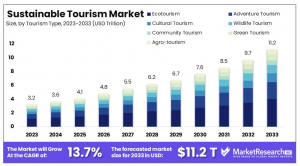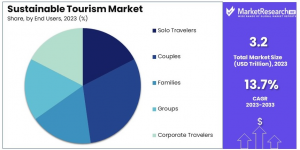Global Sustainable Tourism Market to Reach USD 11.2 Trillion by 2033, Growing at a CAGR of 13.7% from USD 3.2 Trillion in 2023
North America leads the sustainable tourism market with 42.1% share, driven by increased environmental awareness and regulatory support for eco-friendly practices.”
NEW YORK, NY, UNITED STATES, February 2, 2025 /EINPresswire.com/ -- Market Overview— Tajammul Pangarkar
The Global Sustainable Tourism Market size is expected to be worth around USD 11.2 Trillion by 2033, from USD 3.2 Trillion in 2023, growing at a CAGR of 13.7% during the forecast period from 2024 to 2033.
The sustainable tourism market focuses on travel practices that minimize environmental impact, support local communities, and promote cultural preservation. It emphasizes responsible tourism, eco-friendly accommodations, and ethical travel experiences, catering to the growing demand for environmentally conscious and socially responsible travel options.
The sustainable tourism market is witnessing steady growth, driven by increasing consumer awareness about environmental issues and the desire for meaningful travel experiences. Travelers are increasingly prioritizing destinations and operators that demonstrate a commitment to sustainability, such as reducing carbon footprints, conserving natural resources, and supporting local economies. This shift in consumer behavior is reshaping the tourism industry and creating opportunities for sustainable practices.
Governments worldwide are playing a pivotal role in fostering sustainable tourism through investments in eco-friendly infrastructure, conservation projects, and community development programs. Many countries are incentivizing businesses to adopt green practices by offering tax benefits, grants, and subsidies.
Additionally, regulations aimed at reducing over-tourism, protecting biodiversity, and promoting cultural heritage are becoming more stringent. Policies such as carbon offset requirements, waste management mandates, and eco-certifications are encouraging tourism operators to align with sustainability goals. These measures not only enhance the appeal of destinations but also ensure long-term environmental and social benefits.
The sustainable tourism market presents ample opportunities for both new entrants and established players. New businesses can capitalize on niche segments like eco-lodges, adventure tourism, and community-based tourism, which resonate with eco-conscious travelers. Emphasizing unique, localized experiences and transparent sustainability practices can help new players build credibility and attract a loyal customer base.
For existing players, integrating sustainability into their operations can enhance brand reputation and customer loyalty. Collaborating with local communities, adopting renewable energy solutions, and offering carbon-neutral travel packages are effective strategies to differentiate in the market.
Additionally, leveraging digital platforms to promote sustainable travel options and educate consumers about their impact can drive engagement. By aligning with global sustainability trends and regulatory frameworks, businesses can unlock growth potential while contributing to the preservation of natural and cultural resources.
Curious About Market Trends? Request Your Complimentary Sample Report Today: https://marketresearch.biz/report/sustainable-tourism-market/request-sample/
Key Takeaway
-- Market Value: The Sustainable Tourism Market was valued at USD 3.2 trillion in 2023 and is expected to reach USD 11.2 trillion by 2033, with a CAGR of 13.7%.
--By Tourism Type Analysis: Ecotourism dominates with 32%; growing due to increased environmental consciousness and the search for authentic nature-based experiences.
--By Service Type Analysis: Eco-friendly accommodation leads with 41%; reflects rising consumer preference for sustainability in lodging.
--By End User Analysis: Couples dominate at 29%; sustainable travel experiences are increasingly popular for romantic getaways.
--Dominant Region: North America with 42.1%; driven by high consumer awareness and regulatory support for sustainable practices.
Use Cases
Eco-Friendly Accommodations: Sustainable tourism promotes eco-friendly hotels and resorts that use renewable energy, reduce water consumption, and minimize waste. These accommodations attract environmentally conscious travelers seeking responsible travel options.
Community-Based Tourism: This model involves local communities in tourism activities, ensuring economic benefits are shared. Travelers can experience authentic cultural exchanges while supporting local livelihoods and preserving traditions.
Adventure and Nature Tourism: Sustainable tourism encourages low-impact travel to natural areas like forests, mountains, and wildlife reserves. Activities like hiking, birdwatching, and eco-safaris promote conservation and environmental awareness.
Cultural Heritage Tourism: Travelers are increasingly drawn to destinations that preserve and showcase cultural heritage. Sustainable tourism supports the restoration of historical sites, promotes local crafts, and fosters respect for indigenous cultures.
Green Transportation: Sustainable tourism emphasizes the use of eco-friendly transportation options like electric vehicles, bicycles, and public transit. This reduces carbon emissions and aligns with the global push for greener travel practices.
Driving Factors
Environmental Awareness: Growing concern about climate change is shifting travel preferences. Tourists are seeking eco-friendly accommodations and low-impact activities. This consciousness is creating premium opportunities in the sustainable tourism sector.
Local Experience Demand: Travelers increasingly want authentic local cultural experiences. This trend supports small-scale, community-based tourism initiatives. Visitors are willing to pay more for genuine local interactions.
Carbon Footprint Reduction: Travel businesses are investing in carbon offset programs and green technologies. Hotels and tour operators are adopting renewable energy and waste reduction measures. These initiatives are becoming key marketing points for eco-conscious travelers.
Government Support: Many countries are implementing policies to promote sustainable tourism. This includes incentives for eco-friendly facilities and restrictions on mass tourism. Regulatory support is helping establish sustainable tourism infrastructure.
Digital Technology Integration: Smart technology is making sustainable tourism more manageable and measurable. Apps and platforms help tourists make environmentally conscious travel choices. Digital tools are making it easier to track and reduce tourism's environmental impact.
Report Segmentation
By Tourism Type
• Ecotourism
• Adventure Tourism
• Cultural Tourism
• Wildlife Tourism
• Community-based Tourism
• Green Tourism
• Agro-tourism
By Service Type
• Accommodation
• Eco-friendly Hotels
• Green Resorts
• Sustainable Lodges
• Transportation
• Eco-friendly Transport
• Public Transport
• Bicycle Rentals
• Activities and Tours
• Guided Nature Tours
• Wildlife Safaris
• Cultural Heritage Tours
• Food and Beverage
• Local and Organic Restaurants
• Farm-to-table Dining
By End User
• Solo Travelers
• Couples
• Families
• Groups
• Corporate Travelers
Ready to Act on Market Opportunities? Buy Your Report Now and Get 30% off: https://marketresearch.biz/purchase-report/?report_id=48272
Regional Analysis
North America leads the global sustainable tourism market with a substantial 42.1% share, driven by growing consumer awareness and increasing regulatory support for sustainable practices in the travel and tourism sector.
As environmental concerns, such as climate change and biodiversity loss, take center stage, travelers are becoming more conscious of their impact on the planet and are increasingly seeking eco-friendly and responsible tourism options. North American travelers are highly focused on reducing their carbon footprint, opting for eco-certified accommodations, carbon offset programs, and tours that prioritize conservation and local community engagement.
Furthermore, North American governments and organizations are strengthening regulations and providing incentives to encourage sustainable tourism, including initiatives for green certifications and environmental standards for hotels, airlines, and tour operators. The rise of wellness tourism, agritourism, and eco-tourism has also contributed to the region’s dominance in the market, with destinations offering unique, sustainable travel experiences. With sustainability being a key factor in travel decision-making, North America is expected to continue leading the global sustainable tourism market.
Growth Opportunities
Eco-Friendly Accommodations: Developing or promoting eco-lodges, green hotels, and sustainable resorts can attract environmentally conscious travelers. These accommodations often use renewable energy, recycle waste, and source local materials.
Community-Based Tourism: Engaging local communities in tourism activities can provide authentic experiences for travelers while benefiting the local economy. This can include cultural tours, local crafts, and traditional cuisine.
Sustainable Transportation: Offering eco-friendly transport options like electric vehicles, bicycles, or public transit can reduce the carbon footprint of tourism. Promoting these options can appeal to eco-conscious travelers.
Educational Tourism: Creating tours that educate travelers about environmental conservation, wildlife protection, and cultural heritage can attract a niche market. This can include visits to national parks, wildlife sanctuaries, and historical sites.
Digital Platforms for Sustainable Travel: Developing apps or websites that help travelers find eco-friendly accommodations, activities, and transport options can simplify the process of planning sustainable trips. These platforms can also offer tips and resources for responsible travel.
Key Players
• Intrepid Travel
• G Adventures
• Responsible Travel
• TUI Group
• Wilderness Safaris
• Context Travel
• REI Adventures
• Natural Habitat Adventures
• Ecoventura
• Chumbe Island Coral Park
• AndBeyond
• Lindblad Expeditions
• Sustainable Travel International
Not Sure? Request a Sample Report and See How Our Insights Can Drive Your Business: https://marketresearch.biz/report/sustainable-tourism-market/request-sample/
Conclusion
In conclusion, the markets analyzed are all experiencing growth driven by evolving consumer preferences, technological advancements, and increasing demand for customized, high-quality products. Key trends, such as the adoption of sustainable practices, integration of smart technologies, and rising disposable incomes, are shaping the competitive landscape. While challenges such as market saturation, price sensitivity, and regional differences persist, opportunities abound for companies to capitalize on niche segments, leverage digital platforms, and innovate to meet the specific needs of their target audiences. As these industries continue to expand, businesses that adapt to changing trends, prioritize customer-centric strategies, and invest in innovation will be well-positioned for long-term success.
Related Report
Polyhydroxybutyrate Market: https://marketresearch.biz/report/polyhydroxybutyrate-market/
Global Tobacco Market: https://marketresearch.biz/report/global-tobacco-market/
Breather Bags Market: https://marketresearch.biz/report/breather-bags-market/
Paper Straws Market: https://marketresearch.biz/report/paper-straws-market/
Plastic Packaging Market: https://marketresearch.biz/report/plastic-packaging-market/
Kraft Paper Market: https://marketresearch.biz/report/kraft-paper-market/
Growler Market: https://marketresearch.biz/report/growler-market/
Lawrence John
Prudour
+91 91308 55334
Lawrence@prudour.com
Legal Disclaimer:
EIN Presswire provides this news content "as is" without warranty of any kind. We do not accept any responsibility or liability for the accuracy, content, images, videos, licenses, completeness, legality, or reliability of the information contained in this article. If you have any complaints or copyright issues related to this article, kindly contact the author above.




